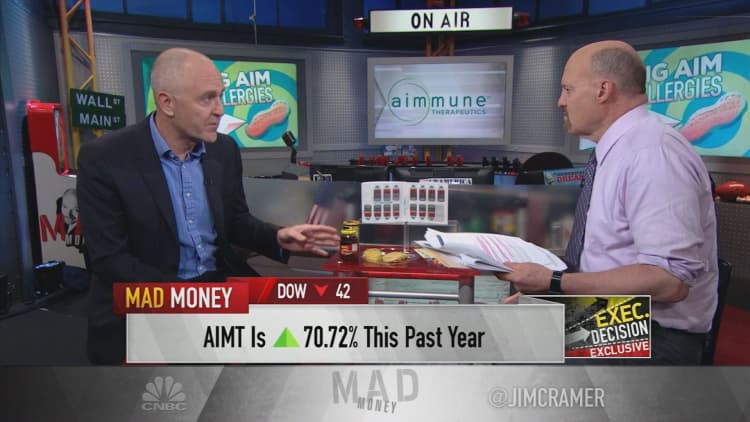
If you think food allergies are getting more and more prevalent in the United States, you're probably right.
Surveys have shown a stark increase in allergy-related incidents in recent years. Experts estimate that up to 20 million people in the United States are affected by food allergies, some of which can manifest in very severe ways.
Between 4 and 6 percent of children and 4 percent of adults are afflicted. The prevalence has led to lawsuits over restaurants' liabilities in food-allergy incidents and studies on the psychological toll allergies can take on patients.
But with its newest drug, biotechnology company Aimmune Therapeutics is trying to buck the trend.
"What we’re doing is taking a technique that’s been around for a while called oral immunotherapy and we’re making it widely available," Stephen Dilly, the company's founding executive chairman and former CEO, told CNBC.
"The idea is that you give people the very protein that they’re allergic to starting in incredibly small quantities they won’t react to, and over time, you give them a little bit more and a little bit more until they can tolerate much more protein," he told "Mad Money" host Jim Cramer in a June 20 interview.
The company's mission is to get patients afflicted by the most common food allergies — in Aimmune's case, peanut, milk and egg — to the point where they can tolerate small amounts of the foods if they accidentally eat them.
Its latest treatment runs counter to what U.S. government agencies recommend when it comes to managing food allergies. Most, including the Food and Drug Administration, recommend "strict avoidance of food allergens" as the best prevention method.
In 2016, however, the U.S. Department of Health and Human Services released the results of a clinical trial that tested a similar treatment. While the release said additional studies were needed, the treatment, which came in the form of a patch, used small amounts of allergen protein to raise patients' tolerance.
Aimmune's leading drug for peanut allergies is currently in Phase 3 of clinical trials. If it proceeds to Phase 4, it will be released to a pool of several thousand volunteer patients.
Dilly also told Cramer the reasons behind the recent uptick in food allergies remain unclear among industry experts.
"There are several really good ideas," he said. "One of them is that we’re all too clean these days — the hygiene hypothesis. Another one is the use of antibiotics early in life. Another one is that the whole idea about dietary restriction [...] used to be that the surgeon general would tell you to avoid peanuts in the first year of life. That’s turned totally on its head, and now early exposure is the goal. So it all says, 'We don’t know.'"
While it waits for its newest drug to clear Phase 3, Aimmune is partnering with consumer food companies, including Nestle's Health Science arm, to both expose lesser-known food allergies and work on introducing more common and nutritious allergens such as milk and egg back into patients' diets.
Dilly, who is staying on as a strategic advisor at Aimmune until the end of 2018, was succeeded by Jayson Dallas, M.D., a biotech and pharmaceutical industry veteran.
Shares of Aimmune climbed intraday on Thursday, gaining roughly 3 percent by market close.
Watch Stephen Dilly's full interview here:




